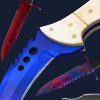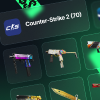A series by CS.MONEY blog explaining how to get into esports (and is it even worth it).

Introduction
Esports is the future.
It lies on the borderline between the entertainment industry and serious sports, but in no case is neither one nor the other. A frequent case in the era of modern technology: several areas merging into one brand new, fresh, with the potential to develop into something huge and settling for a long time.
Historically, the development of esports is comparable to traditional sports. The already-settled and time-tested disciplines/genres (the eternal Counter-Strike or fighting games like Street Fighter) graphically evolve from release to release but carry the same mechanical base. And indeed, completely new projects appear from time to time, shining bright and generating hype. However, they can die just as quickly (this one is for you, Autobattlers).
Take a sober look at modern esports: it is still in its initial development phase. And although the first computer game tournaments took place more than 30 years ago, this “industry” is just beginning to grow stronger, acquiring new branches, producing more jobs, and attracting new sponsors.
And for those who love gaming and dream of working with their hobby, this is the best time to try some luck. Almost every major title has its community, while the competitive part is essential for almost all existing games. So, if you seriously want to get into esports, realistically, it’s about your honest desire to grind and a bit of luck. This sea is full of fish.
The Getting Into Esports series will help you understand how to find a job in esports overall, while the first is introductory, and all subsequent issues will focus on narrow and popular things, such as casting, analysis, working behind the scenes, and so on. By the way, if you want to know about any specific profession, just type it down in the comments, and we will try to answer the questions in the upcoming issues.
In Part I, we’re talking about expectations, most wanted professions, figuring out what’s best for newcomers, and hinting where to look for a job.
But first, answer this one question honestly:
Do you really want an esports job?
Sometimes the desire to combine hobby and work can turn from an expected cheerful pastime into a real nightmare with negative experiences breaking hearts. So think about all the pros and cons at once.
Pros

Cons

These are just the leading indicators, excluding local issues like regions, family issues, language barriers, etc. All in all, esports is a small new world where everyone can find a place.
After weighing all the points and deciding, move on to the next step.
Your talent, tell me about it
As we noted earlier, there is a place for any talented person in esports and many options to get a job. Organizations and clubs, studios and tournament operators, agencies and freelance marketplaces, management and art, investments and design…
Of course, a significant advantage for people starting a career in esports is young age: while studying or living with parents, working for a small salary or even for free will help you earn points on your resume and join the party bus. This is a fairly typical story, and those who enter esports at an older age can experience the difference between generations for themselves.
So, esports welcomes everyone: graphic designers and artists, front- and back-end developers, media workers, PR people, accountants, editors, producers, cameramen, observers, commentators, marketers, managers (for anything), psychologists, coaches, chefs, salespeople, engineers, content makers and content creators (Christ!), community managers, Discord/Twitch/YouTube administrators, testers, 3D-artists and animators, statisticians and data analysts, game designers, all kinds of IT-specialists, merchandise creators, photographers, translators… But you can still work for yourself, creating content or trading and investing (oh, that’s us!).
In short, esports is not limited to teams, studios, and developers. We are already at the stage when the sphere grows into something genuinely professional. Many businesses are being built around esports: player agencies, computer clubs and bootcamps, catering, esports schools, play-to-earn + NFT, and other crypto businesses, etc.
Therefore, just make a decision about who you want to be and keep grinding.
No one likes you when you’re ????̶????̶ 30

That’s a lie. It’s not too late to break into esports at the age of 30. Of course, in terms of speed and energy, you will be inferior to 17-year-olds, but they will never have experience and a good letter of recommendation. There are enough vacancies for Senior and Head positions.
Everything works the same everywhere: technical professions do not vary base-wise; the difference is only in tasks and context. Moving from an IT company to esports will not cause any trouble, but it will be more challenging to adapt to the accounting department of a tournament operator after a state bank or, for example, switching as a sales manager in general. But you already know that: the difference between all spheres in the world is only in the product and context; the periphery does not change.
The Age of Discovery
Here are some vivid examples of how people of different ages and professions found themselves in esports.
Alan “Nahaz” Bester is 45-year-old economics, statistics, and business professor. He came to esports from his field, worked for a little less than ten years, and left to teach again, giving a place to the young. Hosted The International 2019 and 2018 and several Dota 2 Majors quite successfully. Dota is a game for nerds and numbers lovers, so he fit in perfectly.
Jérôme Coupez started Jérôme Coupez started in traditional sports (Formula 1, working in Marketing / Communications) and then opened his own Prodigy Agency. His company has many well-known clients, and he promotes pro players’ comfort and independence from esports organizations. His clients are ZywOo, apEX, TenZ, ScreaM, and many more.
Matthew Hwu is a registered physiotherapist and orthopedist who runs his own healthcare company and works with top teams in North America and Europe to keep players healthy. Gaimin Gladiators’ founders gained experience while running their parents’ business, found investors, and now have rosters in several leading disciplines. Manon Bojan works as a social media manager for OG Esports, although a few years ago she was a regular news writer for GosuGamers.
You got it. There are a lot of examples of people who either started small and succeeded or came to new positions and flourished. And today is the time to participate in esports’ development.
Pros Wanted
Let’s briefly list the most demanded professions in esports.
- Media: journalists, SEO, SMM, content creators, writers
- Marketing: brand, product, and community management, PR, digital,
- IT: security, administration, development, back- and front-end, web development, apps
- Data: analysts, collectors, science
- Commerce: accounting, business development, B2B, B2C, monetization, advertising
- Management: producers, directors, creative, projects, strategy
- Lawyers and Legals of all kinds
- Administrative: office, administrators, executieves, HR
- Sports: managers, admins, referees, coaches, scouts
- Studio: cameramen, lighting, directors, broadcast managers, screenwriters
- Logistics, sound and video directors, artists, programmers, designers, support, production, training, and much more
We have to highlight this one specifically: Video Editors are wanted on high demand. If you catch all the current memes and can compose them into videos, you’re gonna get the job easy!
Where should one look for an esports job?
First of all, indeed, on specialized websites. For example, Hitmarker.net. You can find helpful materials on writing resumes and CVs and browse through vacancies in gaming and esports of any kind.
Also, quite often, people repost vacancies on Twitter. This should generally be your primary social network. Also, scrolling Reddit threads might do. It is worth noting that LinkedIn is developed only by top management in esports: almost no one creates pages on this social network or does them very poorly.
Esports is for everyone
The most significant advantage of esports is that anyone who wants to can get into it, and with due diligence, success will come. Considering the relatively early stage of our industry, there are not enough pros and specialists almost everywhere, so it’s realistic to find a place for yourself.
Esports is one of the most advanced industries globally, getting rid of stereotypes and labels thanks to what is being created by an innovative and advanced generation of young enthusiasts. At the same time, it is interesting and exciting with the sports component being there all the time.

So our best tip for finding a job in esports is simple: don’t hesitate and hop in.
But anyway, let’s sum it up a bit:
- Do not hesitate. Start your career NOW
- Just like in games, grinding is vital. Keep focus on developing your talent
- This is a progressive industry made by youth for youth
- Lots of various vacancies allow you to choose
And here are a couple of practical tips that will help you quickly join esports and find a good offer:
- Be active on socials
- Visit tournaments and meet people
- Don’t be lazy: be in esports without even working in it
- Take a course on how to get a job
- Form your resume
And you’ll make it!
If you want to know anything specific, just leave comments on social networks or below, and we will try to tell you about the professions you are interested in.












